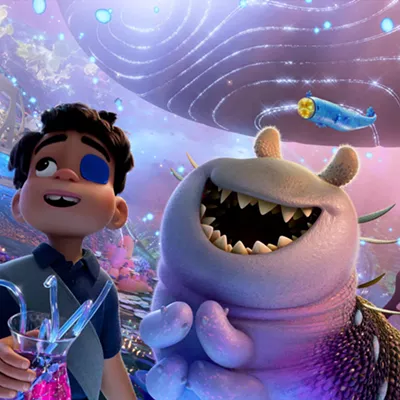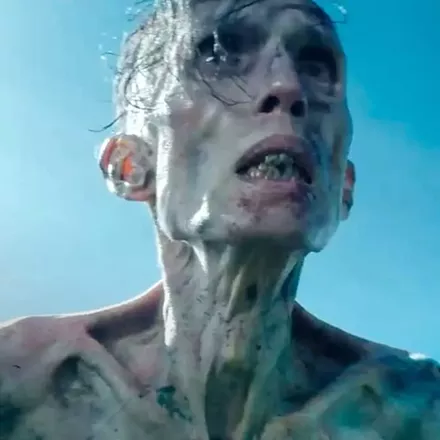"I'm awful sorry about Mel," says a man whose name we never learn, offering his condolences to Pete Perkins (Tommy Lee Jones). "He was a good Mexican."
The Mexican he's referring to was Melquiades Estrada, Perkins' best friend. They had bummed around the same shit-kicker Texas border town together for a while now, herding cattle during the day, shacking up with unhappy housewives by night. (The town, we're led to believe, is full of them.) Estrada's body had just been found by a pair of hunters after the shallow grave that held him was discovered by a coyote. The corpse had two .223 slugs in its chest. The bullets point to manslaughter at least. The grave suggests premeditation, meaning murder.
But no one in town ever suggests either. No one says much of anything. The reason seems linked to those words of sympathy from that anonymous man. Melquiades was a good Mexican, sure, but he was still just a Mexican. And though he may have been murdered, and though those slugs are of a type used almost exclusively by the Border Patrol in their AR-15 assault rifles -- though the evidence points only one place -- no one seems to want to do anything about it because, well, you know.
The first half of the film is a meditation on border life. Racism is at the forefront, but constantly bubbling up are rampant misogyny and adulterous anger, all symptoms of a kind of aimless rage. Early on, outside the trailer of Border Patrol Agent Mike Norton (Barry Pepper), a kid in ratty cutoffs picks up a rock and chucks it at another kid passing by on his bike, yelling, "I'm'a kill you, you sonuvabitch." Like the man who came to Perkins to offer his condolences, we never see these kids again, nor do we know why they were fighting. Director Tommy Lee Jones' camera lingers often on these kinds of scenes, documenting the cultural plagues of this town. The search for Mel's killer sets up Perkins' devotion to his friend while allowing us time to understand the listless sorrow of this place.
The script, by Guillermo Arriaga, cleverly weaves Perkins' investigation of his friend's death with portraits from Melquiades' life, but keeps the two separate. We don't know until much later that this person we're meeting is the corpse the hunters found. By the time we figure it out, that this specter is indeed Melquiades, he's become the most endearing character in the film. His death, then, hits us the way it hits Pete. Hard.
Once Perkins figures out that Norton killed Mel, already knowing that neither the sheriff or the border cops will do anything, he goes vigilante, kidnapping Norton and forcing him on a death march to Melquiades' hometown in Mexico. It's on this journey, we expect, that Norton will find his redemption. While that's true to a point, what happens in the final 20 minutes -- once Perkins, Norton and the now hideously decomposed Estrada reach their destination -- turns all that expectation on its head.
By that point, Perkins has stopped speaking Spanish, despite being fluent and despite being surrounded by people who certainly don't speak English. It's a nuance that's easy to dismiss, but in a film this taut, from a writer (who also wrote 21 Grams and Amores Perros) whose work plants the oddest of allegories in the most unexpected places, everything is relevant. It suggests that Perkins has been slowly alienating himself from reality right next to Norton, though for different reasons. He can no longer communicate with those around him because he's too far inside his own head. Unlike Norton, though, it's not remorse that consumes Perkins, it's grief.
Looking back, we see this madness early on, in the perverse glee with which Jones (the director) films Jones (the actor) torturing his hostage. All the humor in the film's second half is derived from the suffering of Mike Norton, his slow mental collapse. This seems natural at first, but once the film ends, and the audience's perspective on Perkins has changed, we find ourselves wondering why we were laughing so hard at Norton's torment. Suddenly it seems like a pretty crazy thing to do, laughing at all that suffering. Jones' camera has been skewing our perception, only to turn it on us in the end, showing us how sweet and tempting the desire for revenge is and ultimately how empty it leaves us. Revenge may displace grief briefly but cannot lessen it.
A story of riotous laughter and calamitous sorrow, The Three Burials of Melquiades Estrada manages the full gamut of lunatic emotions without cheapening any of them. That's a hell of a feat. It's another triumph for Arriaga and the first in a long time for Tommy Lee Jones.
The Three Burials of Melquiades Estrada; Rated: R; Directed by Tommy Lee Jones; Starring Tommy Lee Jones, Barry Pepper, Julio Cesar Cedillo, Dwight Yoakam


















